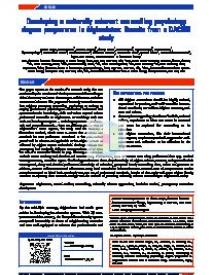Developing a culturally relevant counselling psychology degree programme in Afghanistan : Results from a DACUM study
This paper reports on the results of a research study that was conducted by the members of the Departments of Counselling at Kabul University and Herat University in collaboration with their international advisors. The purpose of the study was to determine how Afghans practicing counselling psychology or wishing to employ professional psychological counsellors understand and operationalize the knowledge, skills and values required to be a professional counsellor in Afghanistan. In workshops with 147 male and female participants − including supervisors, professionals and paraprofessionals − from six different sites in five of Afghanistan’s seven regions, the study used the Develop a Curriculum method, which aims to ensure that curricula and standards for new professions introduced in the post-conflict period will be relevant and applicable in the Afghan context as informed by Afghan experts in the field.
Findings indicate that participants had markedly different conceptualizations of what the role of a counsellor should be (e.g. focusing on individual methods versus working with families and communities). Furthermore, these differences exist along professional lines (e.g. medical versus protection), as well as region. The findings underscore that a deep knowledge of Afghan cultures, customs, and spiritual beliefs was required, along with detailed professional knowledge of individual, group and family counselling ideas, values and practices. In addition, constant self-awareness and reflection at every level is needed to balance these two essential areas of competence to resolve contradictions and to blend both seamlessly into one set of professional standards. Results of this study will assist Afghan faculty members in adjusting their curricula to align with the realities of providing culturally relevant counselling in Afghanistan today.
In: Intervention: Journal of Mental Health and Psychosocial Support in Conflict Affected Areas, ISSN 1571-8883 | 16 | 3 | 231-242
http://doi.org/10.4103/INTV.INTV_54_18


